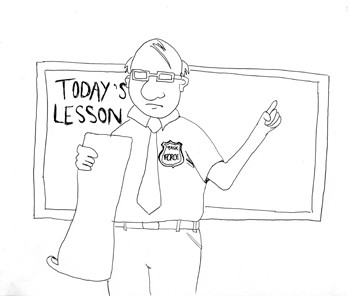
As the spring semester comes to an end Catherine Coleman, sophomore, sits at her dining room table with her planner wide open, syllabi from all her classes and a look of pure stress written on her face. Coleman, along with many other students, is feeling different about this 2008-2009 school year.
“I just feel as if teachers have really stepped it up this year, making classes tougher and tightening up on their policies,” Coleman said.
Coleman is one of many students who say that this school year feels different. Students of every classification are finding classes more demanding and are experiencing a heavier workload.
Located on SMU’s Web site, recommendations from President R. Gerald Turner’s Task Force on Substance Abuse Prevention were implemented in late October of 2008. While most of the updates focused on improvements of drug and alcohol prevention, the last highlighted point was about academic changes.
It reads, “SMU also has implemented several academic recommendations, including scheduling more Friday classes, encouraging faculty to take attendance in class and asking faculty to help identify students at risk.”
Dr. Gary Moskowitz, dean of Undergraduate Business Programs at the Cox School of Business, who was a member of President Turner’s Task Force, is glad to see that students are noticing a change.
“There is an official university policy of trying to insure that students are doing, at least what the faculty and administration think are, reasonable amounts of class work,” Moskowitz said.
As each professor at SMU has his or her own agenda for following the task force’s recommendations, students find that teachers aren’t really focusing on their passion of the subject anymore. By scheduling more Friday classes and taking attendance every class, some students feel that professors are more like baby sitters than actual teachers.
Clark Lundy, senior engineering major, says that professors are definitely making classes harder and much more tedious.
“The direct effect is seen by this mandatory attendance policy. I missed two classes in a public policy class, and I had a 91 test average and an 88 quiz average, but because I missed those two classes, it dropped my average to a B- even before I took the final,” Lundy said. “The administration places a ton of pressure on teachers that once liked to teach. Now it is like they want to take pleasure in failure.”
Dean of the Meadows School of Arts José Bowen said, “There is a conscious effort to improve the academic standing of SMU and that, in fact, we are the most improved university in America, with a 97-point improvement in SAT scores being only one measure. “
With such a massive improvement as this one, SMU’s professors are most likely feeling just as much pressure as the students to keep up with this outstanding reputation. In previous years, there was a handful of difficult teachers to avoid, and by word of mouth students would know not to enroll in one of their sections. As of now, no professor is an easy way out.
“We also continue to hire professors from the very best worldwide institutions, and I imagine they are bringing their standards with them. I certainly have not changed my own courses from the way I taught them at Stanford or Georgetown,” Bowen said.
Naturally, classes are meant to get more difficult as students progress into their selected majors, and marketing major Alex Parker thinks this is the reason for the tough courses.
“Classes are getting more challenging, but I think it is because I am taking more major-specific classes,” Parker said. “However, I do feel as if professors have definitely made changes in their teaching styles.”
With finals in the near future, students are cracking down even harder then before, in an effort to meet their desired goals. As they plan out their schedules for next semester, students realize that there may no longer be that “joke class” or “easy professor.” With this trend of difficult classes on the rise, there is hope for worried students.
“If any student is feeling especially stressed or feels that they’re falling behind, I would urge them to talk to their professors – that kind of communication is very important,” Bowen said. ” Also, I hope students will make use of other campus resources, such as the Altshuler Learning Enhancement Center, which can provide help in a variety of ways.”
To find out more information on the Task Forces’ recommendations visit www.smu.edu/smunews/liveresponsibly.








